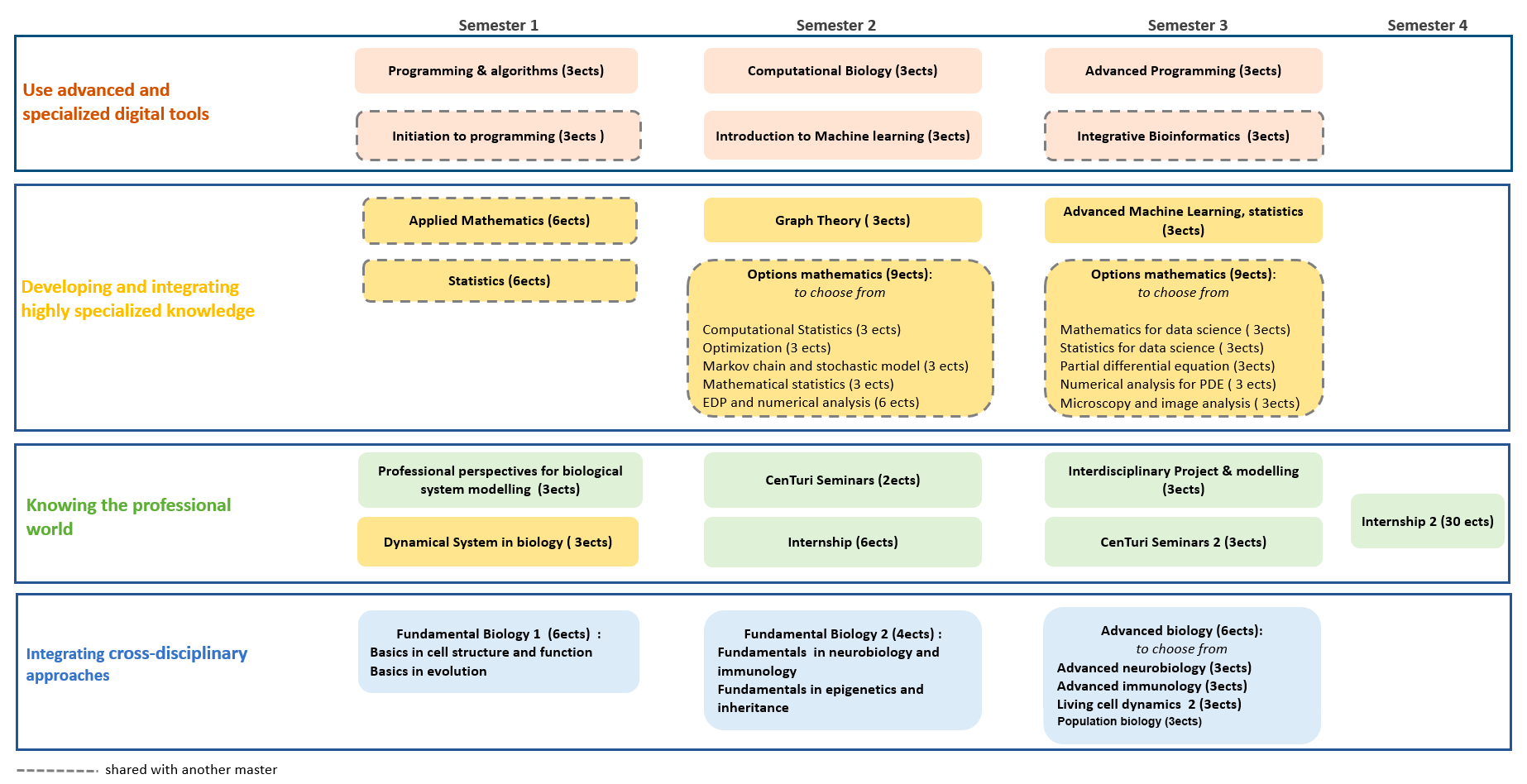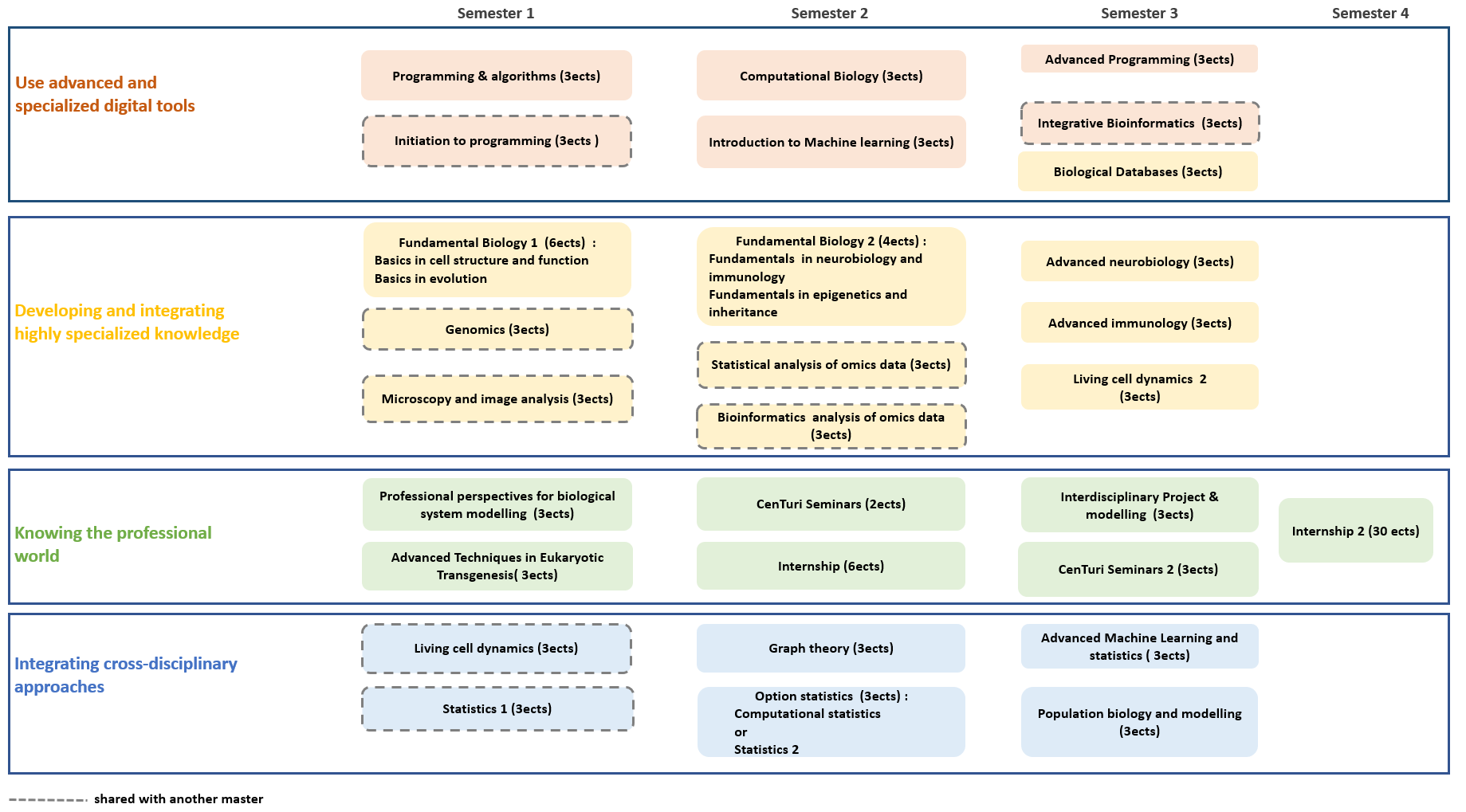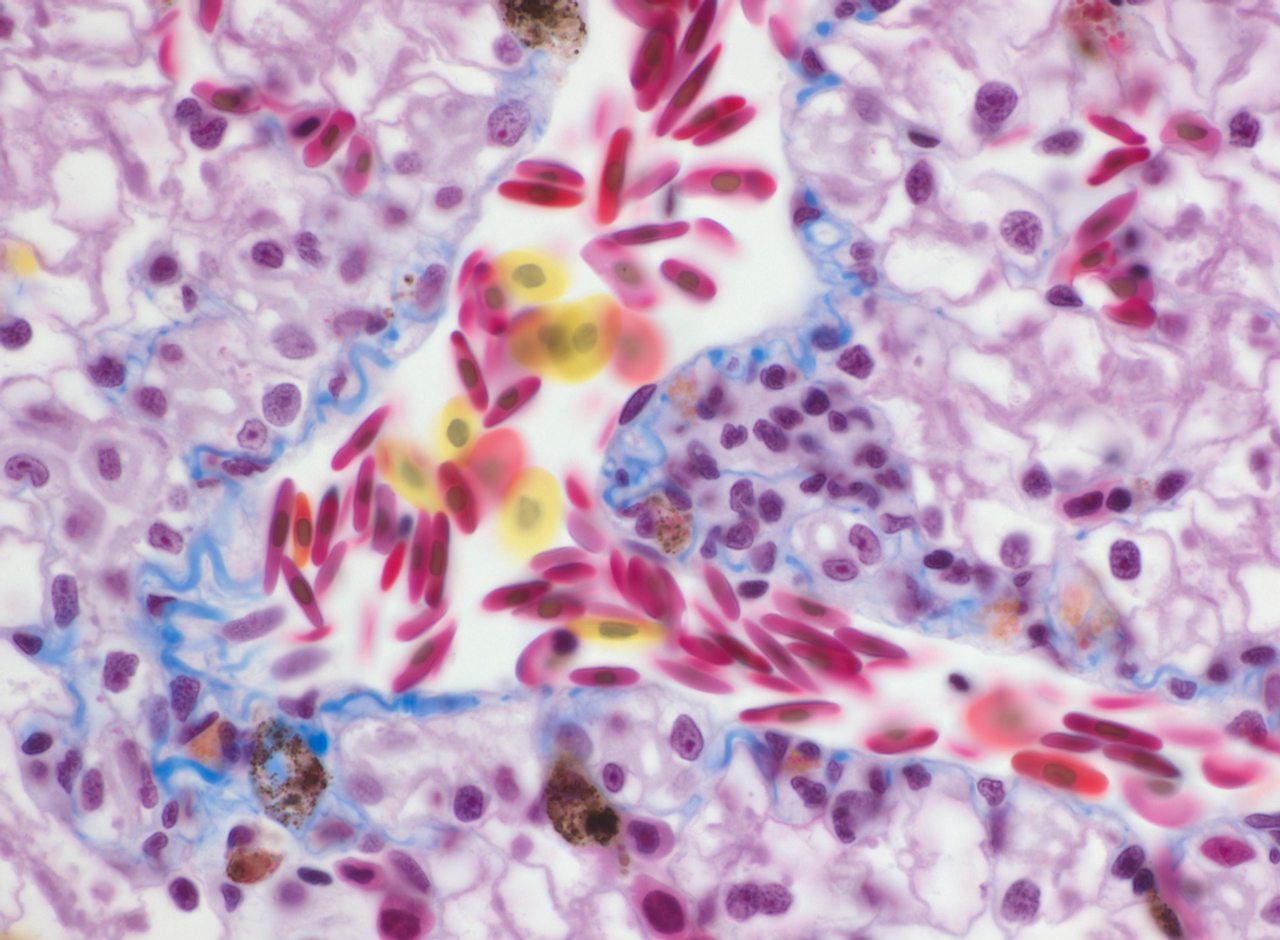The CENTURI Master of Computational and Mathematical Biology (CMB) aims to teach the analysis and the modelling of complex biological systems. Computational and Mathematical Biology accepts bachelor students with a background in Mathematics or Biology. Students with a BSc in Biology are requested to have already minored in either Mathematics or Computer science.
This Master is structured around 2 different 2-year degrees: Statistics and Mathematical modeling or Computational Biology. These 2 majors lead students to address the new challenges of complex biological systems.
While specialising on a major in their own field, students share courses and interdisciplinary projects. Independently from their major, every student will follow courses in Computer Science, Mathematics, Statistics and Computational Biology.
Part of the formation consists in gathering students from the different CMB majors to conduct interdisciplinary projects that will prepare them to research internships and professional careers.
Computational and Mathematical Biology is an international MSc with a strong emphasis placed on students' future professional careers. As such, lectures are taught in English, which is the language most commonly used in research.
What for ?
The CENTURI Master of Computational and Mathematical Biology leads to an Aix-Marseille University degree and prepares students for scientific research.
The students from the statistics and mathematical modeling paths will receive a Master in Applied Mathematics, Statistics diploma whereas the students in Computational Biology will receive a Master in Biology and Integrative Physiology diploma.
With this Master’s degrees, graduates will be qualified for international research institutes as a PhD student or a Research engineer in data analysis, biological systems modelling, analysis of interaction networks, etc.
Graduates also have the opportunity to join private companies’ R&D departments in health care, pharmacology, biosystems and more generally to work on big data issues.
Pedagogic Program
All students will have a common formation in Biology (Cell structure and function, Evolution, Immunology, Neurology, Dynamics of living systems), Computational issues (Python, R), Statistics (tests, machine learning), Mathematics (continuous and discrete modelling), Integrative biology, and will be prepared to their professionnal career.
Statistics and Mathematical Modeling Major
All students will follow courses in Applied Mathematics (Optimization, linear algebra) and Statistics of data science.
Students will have the choice to deepen their knowledge in statistics and big data or in theoretical and numerical analysis of deterministic partial differential equations (P.D.E.) or stochastic problems.
Statistics and big data will lead to exploration, analysis, interpretation and prediction of biological data. Courses will be shared with MSc “Applied Mathematics and Statistics ‘’ and particularly with the major Data Science.
Mathematical modelling will lead to analysis and prediction of biological systems. Courses will be shared with MSc “Mathematics and Applications ‘’ and particularly with the major ANADEAL in the second year.

Computational Biology Major
The students will have a deeper training in biological processes (Development, Neurobiology, Immunology), Evolution, Bioinformatics and Statistical data analysis, Microscopy and image analysis, and the Advanced techniques in eukaryotic transgenesis.
Some Courses will be shared with MSc “Integrative approach to life function“ during semester 1 and with MSc “Structural biology and genomics“ during semester 2 and 3.

Applications and scholarships
How can I join CMB ?
European students can join the Master by sending an application through Mon master.
Students who live outside of the EU can apply by sending an application through the platform called "Etudes en France". This platform is working in association with the Campus France network which includes 68 countries (You can find the list of the countries here : https://www.campusfrance.org/fr/candidature-procedure-etudes-en-france).
If you are a citizen of a country not included in the previous list, you have to apply through the Mon master platform of Aix-Marseille University.
If you encounter any problem, please contact us at cmb@centuri-livingsystems.org.
The Master Computational and Mathematical Biology is affiliated to 2 Masters of Science degrees (Aix-Marseille Université):
- Statistics and Mathematical modeling: MSc Applied Mathematics, Statistics
- Computational Biology: MSc Biology and Integrative Physiology
Please note that you have to pick the Computational and Mathematical Biology track when you select your MSc.
Link to Mon master :
https://www.monmaster.gouv.fr/
More Information: https://www.etudiant.gouv.fr/en/welcome-france-2063
Link to Études en France :
https://www.campusfrance.org/en/application-higher-education-france
More Information: https://www.campusfrance.org/en/application-etudes-en-france-procedure
FAQ
CENTURI Scholarships
Four scholarships will be awarded to CMB Master students for the University year 2025-2026. Aix-Marseille University will finance you up to €10,000 for one academic year and book a room for you in a CROUS university residence.
CMB Scholarships are granted on academic results .
Students can apply to a CMB scholarship until April 15 for both students using Etudes en France campus france procedure and Mon Master procedure.
Eligibility conditions:
- Incoming Master 1 student
- not have been enrolled in a higher education institution in France
- not be French
Internships
CMB students are expected to carry out two internships during their Master:
- One internship lasting at least six weeks, during the first year of the Master
- Another internship lasting 4 to 6 months during the second year of the Master
Here are some examples of internships carried out in 2022 by CMB M2 students:
Internship at IBDM, Marseille, France
Internship title: From molecular diffusion to organ formation: Tracking endocytosis across scales in the developing embryo
Internship objectives:
- Understanding the image formation process in fluorescence microscopy.
- Modeling biodynamics under constrains of computational scalability.
- Bayesian filtering for biodynamics.
- Interdisciplinary communication
Internship at I2M, Marseille, France
Internship title: Unsupervised motion estimation for the exploration of molecular processes in 3D light-sheet microscopy
Internship objectives:
- Understanding the image formation process in fluorescence microscopy.
- Modeling biodynamics under constrains of computational scalability.
- Bayesian filtering for biodynamics.
- Interdisciplinary communication.
- Formulating biological hypothesis and quantitatively interrogate them


